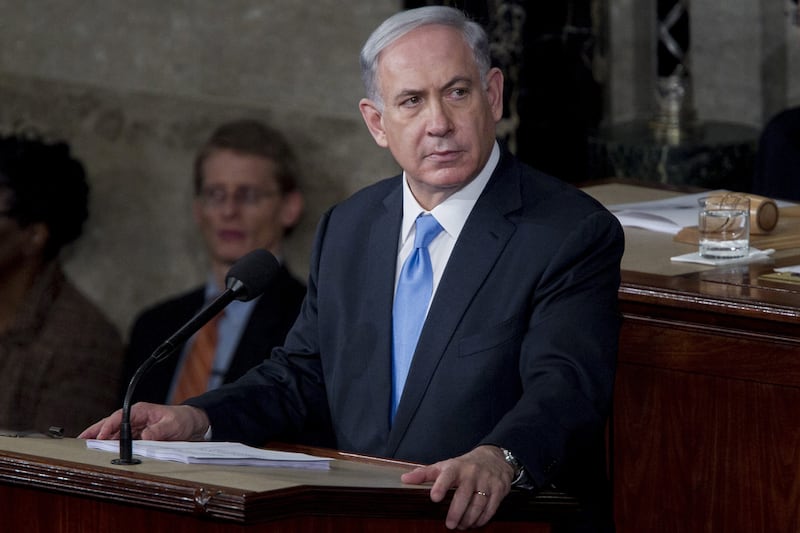In September 2012, Benjamin Netanyahu stood before the United Nations General Assembly in New York with a chart showing a cartoon bomb to demonstrate Iran’s progress towards a nuclear warhead. Red marker pen in hand, Mr Netanyahu suggested that by the end of 2013 Iran would have enriched enough uranium to create a nuclear weapon.
That threshold has still not been reached, as far as reliable estimates show. The performance before the UN was dismissed by experts as ludicrous, but it probably achieved the goal of influencing US opinion on a topic that Mr Netanyahu has always pursued with zeal.
This week the Israeli prime minister has been grandstanding again, this time before the US congress. He had no visual aids with him, but a cartoonist from the Saudi newspaper Al Watan has filled the gap. In the cartoon, Mr Netanyahu is shown holding up a bomb, but this time it is under the dome of the US Capitol.
The truth captured in this carton is simple: Mr Netanyahu has thrown a grenade into US politics, killing off a tradition of bipartisan support for Israel and its prime minister. Instead, support for Israel is turning into a Republican stick to beat Barack Obama with.
Some Democrats boycotted Mr Netanyahu’s appearance, on the grounds that with two weeks to go before an election, he should not be allowed to use the occasion to campaign for a new term as Israeli prime minister. Others felt it was shameful to invite a foreign leader to criticise their president and to lobby against a presumed deal with Iran that is still under negotiation.
Anyone listening to the speech had to conclude that Mr Netanyahu was dead-set against negotiations with Iran and favoured harsh sanctions. Why he thought an endless sanctions regime would force Iran to surrender – rather than the more likely outcome of actually pursuing a nuclear weapon – was not stated.
For the record, the prime minister said he favoured a “better” deal than Mr Obama was pursuing, but offered no clue what this involved.
Bizarrely, Israeli spin doctors tried to convince the US media that the speech presented an unspoken concession because he failed to insist that Iran should have zero uranium enrichment capacity. If he came to Washington to offer support to the president, then this was surely the most coded message in the history of diplomacy.
The Republicans, who control both houses of Congress and invited Mr Netanyahu, have rushed to capitalise by trying to fast-track legislation that would allow it to block any nuclear deal with Iran.
This has shocked Democrats and forced them into a difficult position. They now have to choose between loyalty to their president or a foreign leader. The US negotiators are now being presented in Iran as pawns for Israel, which adds another argument for Iranian hardliners. As for the American Jewish community, it is facing a choice between blind support of Israel and an increasingly attractive option of showing support through what might be called constructive criticism.
For decades, bipartisan support for Israel has been recognised inside Israel as the bedrock of the relationship with Washington. This has allowed pro-Israeli votes to pass with barely a dissenting voice in the Senate. Those days have gone.
One reason for the fraying of bipartisanship is Mr Netanyahu’s polarising character. In 2001 he boasted that he could easily move America in the direction he chose.
But after nine years in power – in two separate stints – he is following the path of other politicians who come to believe they are bigger than the countries that elect them. By making Israel a political issue he may change the terms of the relationship forever.
It is worth looking at how this happened. It is generally assumed that support for Israel is falling in America, particularly among young people on university campuses and indeed among Jews who oppose Mr Netanyahu.
The latest Gallup poll, however, shows 70 per cent of Americans have a favourable opinion of Israel, against 17 per cent who favour the Palestinian Authority. This is actually higher than decades ago – it was below 50 per cent in 1989. What has changed is that support among Democrats has remained stable, but has shot up among Republicans.
The difference between the two parties is even more pronounced when the issue is the Israeli prime minister. Sixty per cent of Republicans view him favourably, against 31 per cent of Democrats.
This surge in support on the Right for Israel has a lot to do with Republicans who have been checking out of the real world to inhabit a virtual universe where Mr Obama is a secret Muslim and Sharia is about to be imposed by the federal government.
Mark Mellman, a political consultant, sees three reasons for the Republican love-in with Israel: the rise of evangelical Christians who are theologically pro-Israel; the “Clash of Civilisations” ideology that presents Israel as a bulwark against domination by Islam, and the hyper-partisan atmosphere in Washington where vocal support for Israel has become a badge of tribal identity among Republican leaders.
There are two ways to interpret the polling figures. One is that when the White House is no longer home to a president whose middle name is Hussein the partisan tide will retreat to leave a solid foundation of public support for Israel. A more realistic view is that Mr Netanyahu’s grenade thrown in to the US Capitol will leave lasting scars, and reflexive alignment with Israel will be a feature of the political right for whom patriotism is supporting a foreign leader in need of a campaign fillip.
Alan Philps is a commentator on global affairs
On Twitter: @aphilps





